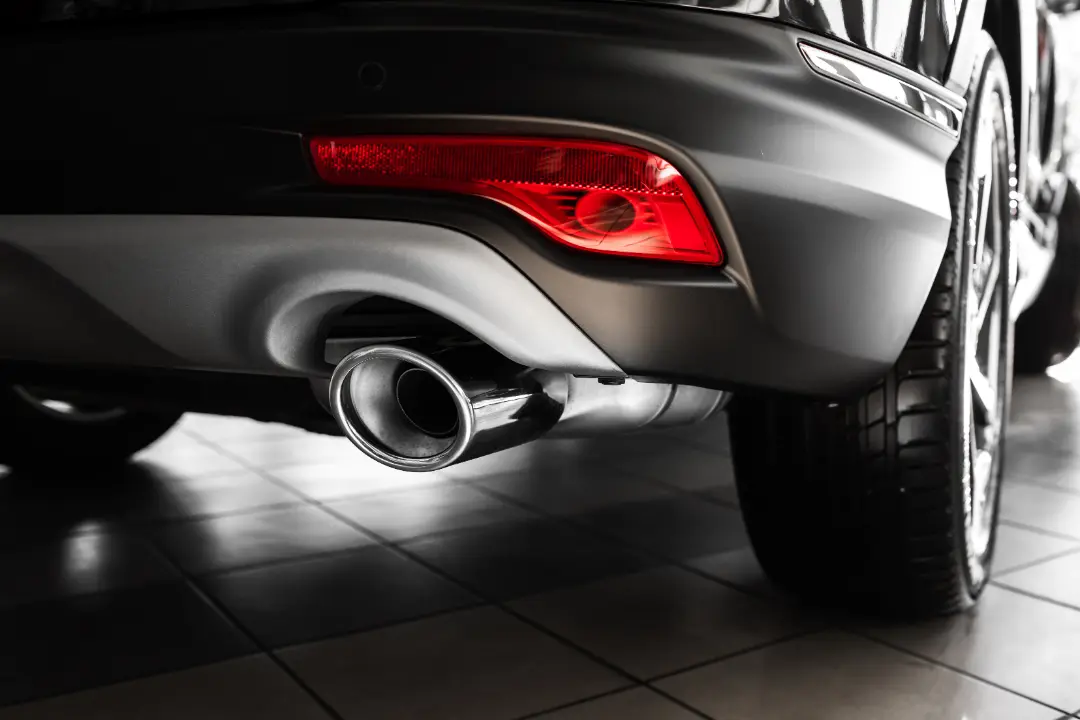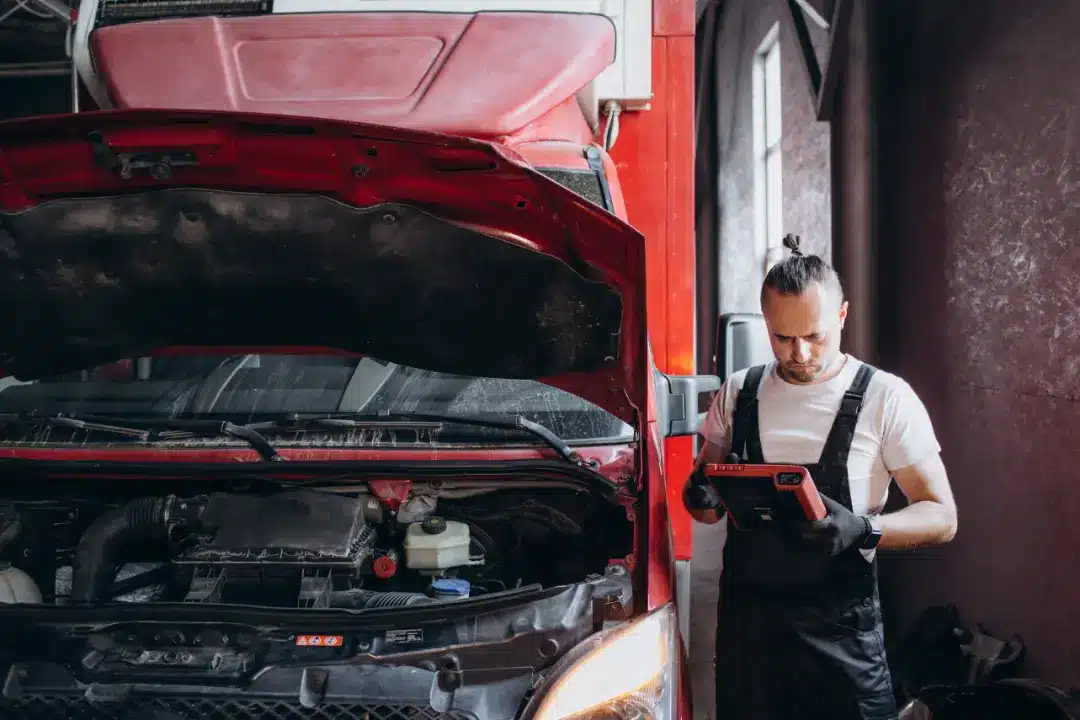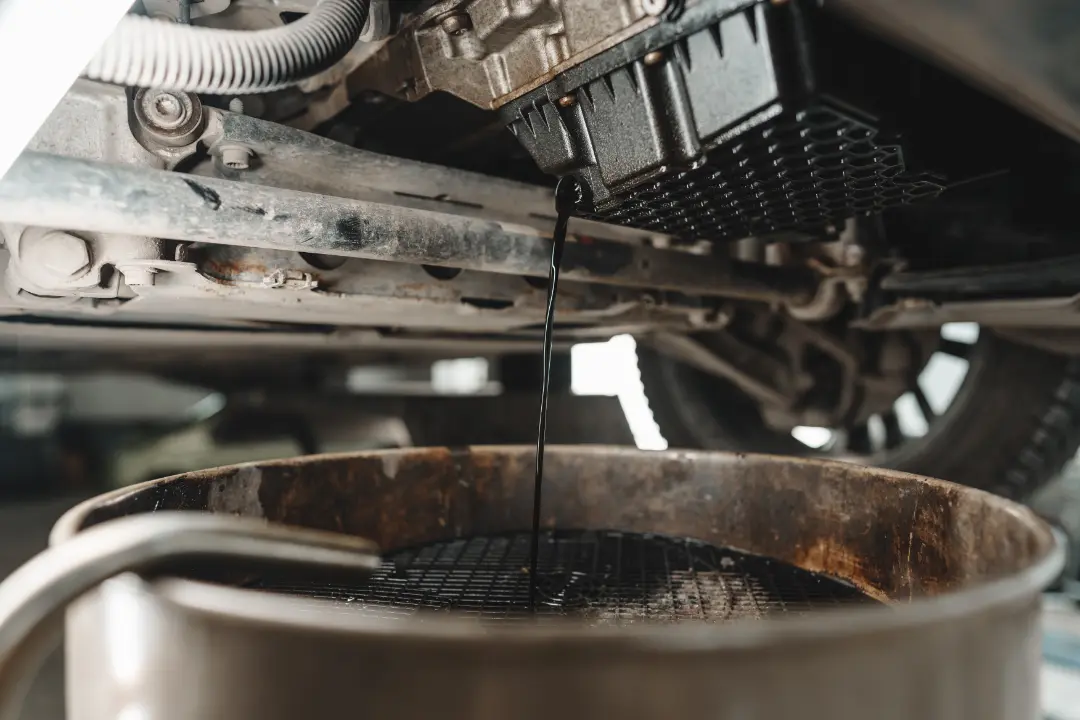Why is my car squeaking when I brake? This frustrating noise often points to worn brake pads, a build-up of rust, or brake component misalignment. We’ll walk you through the common causes and provide insights on how to silence those squeaks, ensuring your safety and your car’s proper functionality.
Key Takeaways
- Squeaking brakes are a common symptom of worn brake pads, which may require inspection and replacement to ensure safe braking performance.
- Other causes of brake noise include rotor issues, calliper misalignment, rust accumulation, and improper bedding-in of new brakes.
- Environmental factors like weather conditions and road debris can affect braking systems and may lead to temporary noise issues that are typically resolved with regular driving and proper maintenance.
Why Does Your Car Squeak When You Brake?
Worn brake pads can produce a high-pitched squealing sound, indicating that they need to be replaced. Ignoring this sound may lead to costly repairs or compromised safety, but understanding these signs is essential for maintaining smooth and secure braking performance.
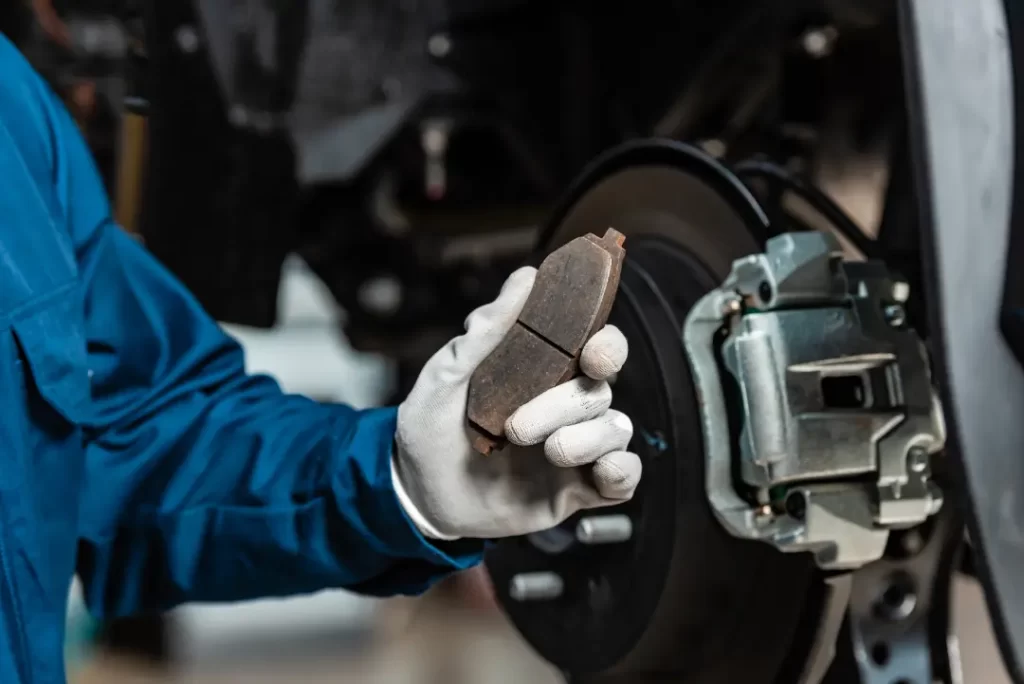
Worn Brake Pads
The squeaking sound of brakes usually begins when the metal wear indicator, designed to protect and alert, comes into play. As the brake pads wear down from constant contact with the brake discs, this little conductor signals the need for attention with a squeaking noise during braking.
To visually inspect your brake pads, look through the wheel spokes for a thickness of less than 3mm. If you can’t find the wear indicator slot on your pads, it’s time to acknowledge the need for a change and give them a well-deserved retirement.
Remember, as the pads become thinner due to the friction of braking, their ability to stop the vehicle decreases, which could lead to an unsafe situation.
The Role of the Metal Wear Indicator
The metal wear indicator is an important component that should not be overlooked. It is designed to emit a high-pitched squeal to alert the driver when the brake pads are worn thin and need to be replaced. This small metal tab is located within the brake pad assembly and produces a distinctive noise when the pad material has worn down to a critical level.
When the brake pads have reached their limit, the metal wear indicator comes into contact with the rotor, causing a noticeable squeaking noise during braking. This sound signals that it’s time to replace the brake pads to ensure the smooth operation of your vehicle’s braking system.
Brake Caliper and Rotor Issues: When Metal Meets Metal
When the combination of brake pads, callipers, and rotors does not work smoothly, it is usually due to a significant metal-on-metal interaction. This friction disrupts the proper functioning of your car’s mechanics and poses a risk of causing significant damage to the rotors, potentially leading to an expensive and unscheduled repair.
Mechanical issues within the brake calliper can be likened to out-of-sync musicians in an ensemble. They can cause the brake pads to stick to the rotor, resulting in a constant background noise that persists even when the brake pedal is not being pressed. If your vehicle’s brakes are making more noise than they should, it’s essential to investigate the relationship between your callipers and rotors for any issues.
Rust’s Impact on Your Car Brakes
Rust on brake discs can transform a smooth braking experience into a jarring and noisy one. It is caused by the continuous oxidation of the rotor surface due to exposure to moisture and environmental elements. Rust is a common problem affecting car brakes’ longevity and performance. When rust builds up on the brake discs, it leads to noise and vibrations during braking, indicating that the brakes are under stress.
Vehicles that remain stationary for long periods are more prone to developing rust, as the lack of movement prevents the brake pads from regularly polishing the rotors.
Additionally, rusty brake calliper slide pins can impede smooth movement, resulting in uneven pressure from the pads against the discs and causing squeaking noises. Keeping your brakes in regular use is crucial to prevent rust build-up and ensure optimal braking performance.
Misaligned or Sticking Brake Calliper
A misaligned or sticking brake calliper causes constant friction between the brake pads and rotors. This consistent rubbing can lead to a persistent and annoying squeaking noise. If your car veers to one side when braking, it indicates a problem with the calliper that needs realignment.
Calliper pistons that encounter resistance from debris or rust may fail to slide smoothly, leading to uneven pad wear and squeaking. Incorrectly installed components or improperly tightened lug nuts can also throw the brakes out of alignment, creating a noisy disturbance.
When the calliper sticks and presses the pads against the rotor, it not only creates grinding and squeaking sounds but can also generate excessive heat that could warp the performance of the entire brake system.
How Hard Braking Affects Your Brakes
Hard braking can lead to glazed brake pads, reducing their ability to grip and perform their braking action. This can cause a loud squeaking noise, brake shudder, and vibration. To restore the brake performance, a technician may need to remove the glazed layer from the brake parts.
Preventing harsh braking whenever possible is essential to avoid the accumulation of this glazed layer and maintain smooth, responsive braking power for your vehicle.
Understanding Glazed Brake Pads
Glazed brake pads result from excessive heat exposure, causing the friction material to harden and create a smooth, glassy surface that reduces brake performance. To prevent this issue, consider using ceramic brake pads, which are known for their heat resistance and durability.
The Consequences of Continuous Hard Braking
Continuous hard braking can have serious consequences. It can cause brake noise, warped rotors, and a pulsating brake pedal that may shake your confidence in your vehicle’s reliability. These vibrations indicate that the brake pads have been pushed beyond their limits and have started to warp from the heat. When brake pads become glazed, they can no longer create the necessary friction for a smooth stop.
Additionally, carrying heavy loads can exacerbate these issues, requiring more energy to slow down the vehicle and putting greater strain on the brakes. This can lead to more intense pressure on the brakes and potentially worsening noise problems. To maintain a balanced and efficient brake system, it’s essential to be mindful of your braking habits, especially when carrying heavy loads.
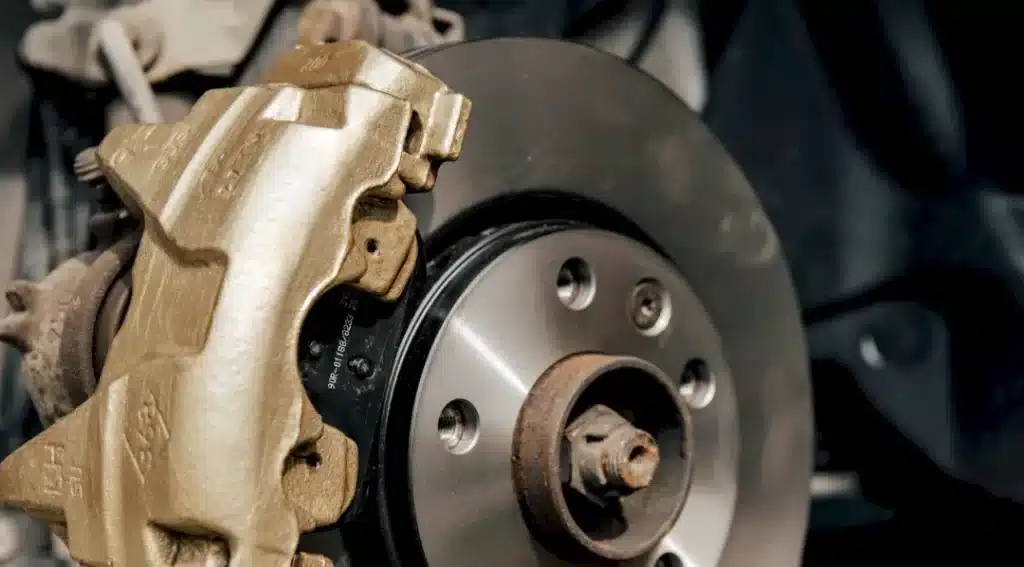
What Happens When You Hear Squeaks from New Brakes?
When you get new brakes, you might hear some squeaking noises at first. This is normal and part of the process of breaking in the brakes, which is important for ensuring that your brakes work well. Eventually, the squeaking should go away as the brakes settle in.
You can speed up this process by driving and braking repeatedly over a short distance. This helps to smooth out the brakes and stop the squeaking.
What to Expect with New Car Brakes
When you first drive your new car, you might hear a squealing noise when you brake. This noise is often a normal part of the process of new brakes settling in. It happens because of the friction between the new brakes and the transfer layer.
To remove the transfer layer and stop the squealing, you need to perform some specific braking and accelerating steps, similar to tuning a new instrument. This process ensures that your car’s brakes work perfectly right from the start.
Give New Brakes Time to Adjust
New brakes may produce squeaking noises occasionally, but if the noises persist, it could indicate the need for further adjustments or checks to prevent squeaky brakes. It’s important to be patient during this time to allow your new brakes to settle and adjust to their role in your car’s braking system.
Environmental Factors and Your Brake System
Environmental factors can have a significant impact on the health of your vehicle’s brake system. Changes in weather and the type of terrain you drive on can cause your brakes to make squeaking noises. For example, rain, snow, mud, and brake dust can all contribute to brake squeaking, grinding, or reduced performance.
Rust can accumulate on the brake rotors, especially after exposure to moisture, causing squeaking in the morning. This issue is often resolved after a few brake applications. Regular driving can help remove this rust and prevent calliper issues. Parking in a dry environment can also reduce moisture-related build-up on your brake rotors.
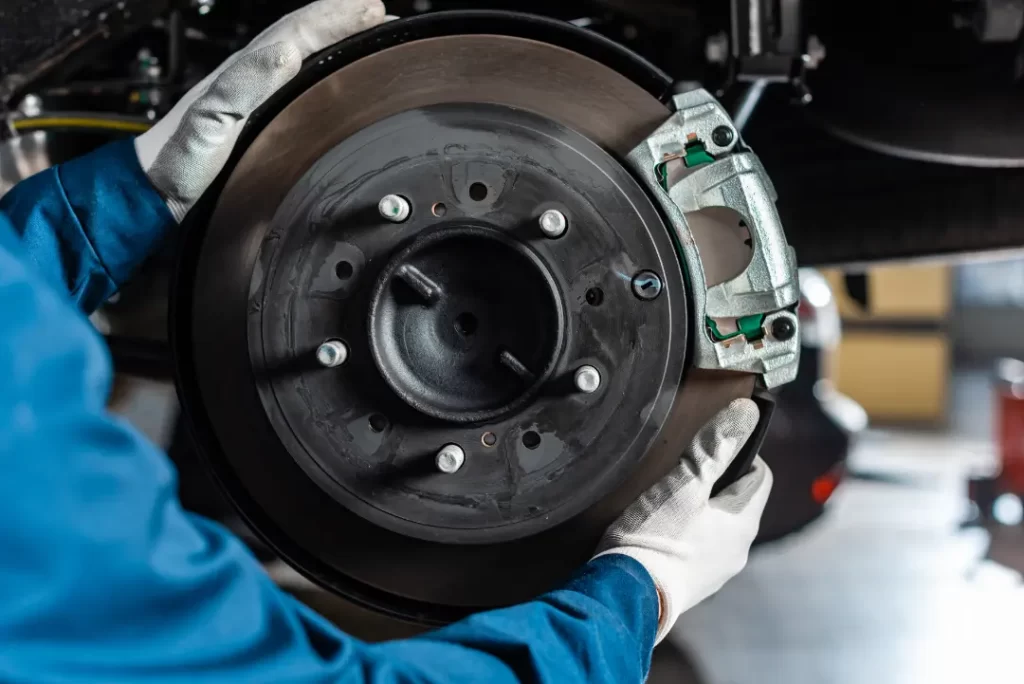
Weather-Induced Brake Noises
Weather conditions such as morning dew, rain, snow, or living in a humid area can lead to the development of rust on brake rotors, creating a stage for unwanted noise during performances. A thin layer of rust over the rotors can create squeaking or grinding noises, mimicking the sounds produced by worn brake pads.
While the squeaking noise from rust is typically temporary, as the act of braking often scrapes off the rust and clears the noise, excessive rust can compromise the integrity of the rotors. This can lead to reduced braking effectiveness and longer stopping distances, a situation you want to avoid to keep your vehicle’s braking system in tip-top shape.
Road Debris and Its Effects on Braking
The roads we travel can be littered with stones, grit, and other debris, which can find their way into our brake systems and cause noises such as squeaking or grinding. To avoid these noise problems, it’s important to ensure that brake components are meticulously cleaned before installation, eliminating any dust or debris that might induce squeaking between the parts.
Contaminants like rust particles from the rotor can exacerbate the wear of brake pads and diminish braking performance, potentially making the brakes less effective over time. If a simple cleaning and proper installation don’t resolve the debris-induced noises, it is advisable to seek professional help to ensure the safe and proper functioning of your brake system.
Sovereign Motor Engineers: Your Trusted Partner for Expert Car Service and Repair
When it’s time to address the sounds coming from your brakes, there’s no better choice than Sovereign Motor Engineers. Our family-run business, located in Tonbridge, has been providing expert vehicle service since 2010. We combine expertise with excellent customer care.
Whether it’s the squeal of worn pads or the grinding of a misaligned calliper, our skilled team at Sovereign Motor Engineers offers a full diagnostic and repair service for a wide range of car models, ensuring your vehicle runs smoothly on the road.
We are committed to providing high-quality service using only the best parts available to ensure top performance and longevity of your vehicle’s brakes, including the brake fluid. At Sovereign Motor Engineers, you’re not just getting a repair; you’re entrusting your vehicle to passionate professionals who treat every car like a classic and every customer like family. Schedule your consultation today.
From Diagnostics to Repairs: How We Can Help
At Sovereign Motor Engineers, our services will uncover the root of the squeaks and grinds, ensuring that your vehicle is not just roadworthy but stage-ready. Transparency and trust are our priorities, with straightforward quotes for repair services that provide a clear understanding of the necessary work without any hidden surprises.
Whether you need an MOT, car servicing, or attention for your classic or vintage car, Sovereign Motor Engineers take care of every aspect of your vehicle, ensuring that every journey is as smooth as a classical overture. Schedule your consultation today.
Frequently Asked Questions
Why do my brakes squeak even after getting new pads?
The squeaking noise after getting new brake pads is normal during bedding-in. However, if the squeaking continues, it may signal the need for further adjustment or attention to other brake system components.
Can the weather really affect my brake system?
Yes, weather can affect your brake system by causing rust development on brake rotors, leading to temporary squeaking sounds, especially in rainy, snowy, or humid conditions. Regularly driving and parking in dry conditions can help address this issue.
How do I know if my brake pads are worn out?
You can tell if your brake pads are worn out if you hear squeaking noises during braking, notice the pad thickness is less than 3mm, or if the wear indicator slot is absent. Observing these signs can help you know when it’s time to replace your brake pads.
What is the metal wear indicator, and what does it do?
The metal wear indicator is a small metal tab on the brake pad that emits a high-pitched squeal when the pad material wears down to a critical level. This serves as an audible warning to the driver that the pads need to be replaced.
Summary
You now know that the noises coming from our vehicles are not just annoying but important signals that should not be ignored. From recognizing worn brake pads to understanding the impact of environmental factors and hard braking, this knowledge empowers you to diagnose issues, proactively maintain your brakes, and seek professional help when necessary.
If your car’s braking performance is noisy rather than smooth, Sovereign Motor Engineers is ready to restore harmony to your ride. With our expertise, we can make your brakes stop squeaking and ensure the safety and reliability you need to drive confidently. Visit our garage today.

